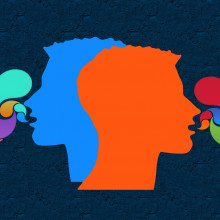QotW - What language do deaf people think in?
Bree asked: "If a person is born completely deaf and can't hear a thing, what language do they think in?"
In this episode

00:00 - If you're deaf, what language do you think in?
If you're deaf, what language do you think in?
Mariana - We put this question on our forum and one of the answers came from Doug, who says he’s profoundly deaf and thinks in associations and pictures. He doesn’t think "I'm going to get a glass of water", he just tends to visualize the glass of water and associate it with thirst. To elaborate on this, we got in touch with Dr Mairead MacSweeney, who’s the director of the Deafness Cognition and Language Research Centre at University College London.
Mairead - The answer to this question very much depends on the type of communication the deaf person uses in their daily life.Their language choices and preferences can depend on many different factors. For example, whether they were born deaf or became deaf later in life; how much useful information they can hear from either hearing aids or cochlear implants; and whether they were exposed to a sign language early. Sign languages are interesting because they are different in different countries. Deaf people are most likely to think in their dominant, their most used language, which could be a signed or spoken language.
Mariana - But how exactly are the thoughts shaped in their minds?
Mairead - When deaf people think in sign language, they report having a motoric feeling of themselves signing. This could be thought of as ‘inner sign’ in the same way that hearing people report ‘inner speech’. Others think in spoken language, either that they might be able to feel the mouth movements of speech, or they can visualise lip patterns, or in some cases ‘hear’ the speech. This auditory imagery is most likely to reflect their own auditory experience of speech. Deaf people have also reported switching between imagining themselves communicating and imagining perceiving, or watching the communication of others. Some deaf people have even reported that they think in written English, describing visualising subtitles or Star Wars text, disappearing off into the distance.
Mariana - That would certainly make everyday tasks more interesting! Deaf people also report thinking in different languages depending on what they are thinking about.
Mairead - So, a deaf person who uses sign language at home with their family might think of a shopping list in sign language, but if they use speech at work, they might be more likely to report thinking about their work-related tasks in speech. The deaf population is very diverse. It is these differences in language backgrounds and personal experience that affect which languages they acquire and therefore what language they think in.





Comments
Your reply to PR is rude.
Your reply to PR is rude. What you did was typical- you put the question out in the open and got an answer from a random deaf person then you go and talk to a HEARING “expert” rather than going to talk to Deaf neuroscientists or linguists. The big picture here is that you don’t go and get this question answered by the Deaf community, but the authority is being held by a hearing expert. PR had every right to question your journalistic approach. Interesting question, yes, and I’d love to have Deaf experts answer questions like “what goes on in a person’s mind when they hear something?”
Thank you for your input.
Thank you for your input.
"PR" says "Don’t you think it would be more accurate/appropriate to ask a deaf person that kind of question?"
You note that this says "a deaf person". This presumes that we have not sought such an opinion. In fact, we did, and we cited one of the responses in the answer; then we asked a person who is an international expert on this topic to provide her opinion too. We also approached an appropriate national charity, but they were unable to find anyone willing or able to provide an opinion within a reasonable time frame.
Maybe you are not familiar with how we operate these question of the week segments? We air the question at least a week ahead of each answer, and support the aired version with an online forum post so that people can debate and contribute to the answer. This is also promoted via social media. We then work with the responses we receive, supplemented by input from respected authorities.
The intention is not to be rude to anyone, but the glib feedback, as phrased, strongly suggests that, at the time of writing, PR had not actually read or listened to the answer before making the pronouncement. We work very hard to ensure the quality of the material we produce, including ensuring that the content is valid, accurate, representative and balanced.
Don’t you think it would be
Don’t you think it would be more accurate/appropriate to ask a deaf person that kind of question?
Did you actually listen to
Did you actually listen to the answer before condescendingly condemning the question?
Clearly not, because, if you had done so, you would have heard that we did indeed ask a deaf person and they have provided their perspective right at the start of the answer.
In fact, you could have clicked "FULL TRANSCRIPT" and read the answer properly, and you would have seen that: the clue's in the first line:
"We put this question on our forum and one of the answers came from Doug, who says he’s profoundly deaf and thinks in associations and pictures. He doesn’t think "I'm going to get a glass of water", he just tends to visualize the glass of water and associate it with thirst."
Add a comment